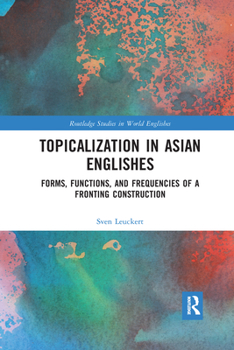Topicalization in Asian Englishes: Forms, Functions, and Frequencies of a Fronting Construction
(Part of the Routledge Studies in World Englishes Series)
Select Format
Select Condition 
Book Overview
Shortlisted for the 2020 ESSE Book Award in English Language and Linguistics
This monograph is the first comprehensive study of topicalization in Asian second-language varieties of English and provides an in-depth analysis of the forms, functions, and frequencies of topicalization in four Asian Englishes. Topicalization, that is, the sentence-initial placement of constituents other than the subject, has been found to occur frequently in the English spoken by many Asians, but so far the possible reasons for this have never been scrutinized. This book closes this research gap by taking into account the structures of the major contact languages, the roles of second-language acquisition and politeness as well as other factors in order to explain why topicalization is highly frequent in some varieties such as Indian English and much less frequent in other varieties such as Hong Kong English. In addition to exploring major and minor forces involved in explaining the frequency of topicalization, the forms and functions of the feature are assessed. Central questions addressed in this regard are the following: Which syntactic constituents tend to be topicalized the most and the least frequently? Which discourse effects does topicalization achieve? How can we approach topicalization methodologically? And, lastly, which influence do language processing and production have on topicalization?
Related Subjects
Language Arts




